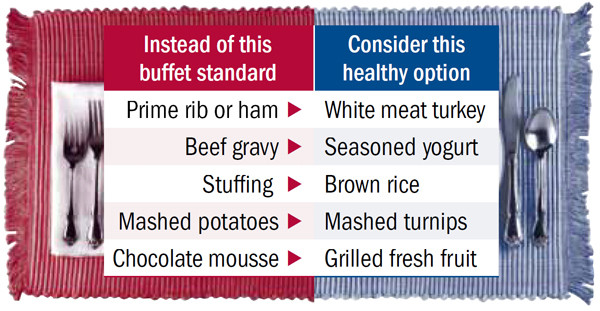Harvard Health Blog
Making peace with holiday buffets
Overeating during the holidays is practically a tradition. “We rationalize that it’s a special time, with foods that aren’t available throughout the year,” says registered dietitian Kathy McManus, director of the Department of Nutrition at Harvard-affiliated Brigham and Women’s Hospital. But overindulging can lead to weight gain, fatigue, and guilt. So how should you approach the holiday buffet? Here are some tactical strategies to get you through the season of eating.
Plan ahead. Find out when you’ll be eating, and plan your day around it. For example, if you know a big dinner will be served at 8 p.m., eat a lighter breakfast and lunch than usual. But also have a healthy snack just before you leave home at 6 p.m. so that you don’t arrive at the party feeling hungry; otherwise you’ll overeat.
Also, ask if you can bring a dish for the buffet. If the answer is “yes,” bring something healthy, such as chicken and veggie skewers or an assortment of fruit.
At the buffet. Grab a salad plate instead of a dinner plate. You’ll fool yourself into maintaining portion control. Avoid foods that are fried, buttered, creamy, or cheesy. Load at least half of your plate with veggies, then add just a taste of other foods. But choose wisely; don’t waste calories on foods that aren’t special. For example, a roll with butter can easily add 200 calories.
At the table. Research shows you’ll eat less food and take in fewer calories if you eat slowly, so pace yourself at holiday meals. Do this by taking small bites, chewing slowly, and sipping water between bites. When you’ve finished, don’t linger at the table, which may encourage more eating. The reason to eat slowly is that it takes at least 20 minutes for your brain to get the message that you’re full. It’s easy to consume many more calories than you need in 20 minutes. In fact, you can consume all the calories you need for a whole day in 20 minutes.
About alcohol. Alcohol adds calories in a hurry, and it can ruin your resolve. McManus advises that you delay drinking until you begin your meal. Set a limit in advance, and ask your host or buddy for help observing the rule.
If all else fails. When temptation trumps resolve, don’t beat yourself up, and don’t feel you’ve failed. Just go back to a healthy eating plan as soon as possible. “Don’t feel guilty about food,” says McManus. “It’s there to enjoy. But you must give your meals some thought.” Think of this planning as a little gift you give yourself.

(This article first appeared in the Harvard Health Letter.)
About the Author

Heidi Godman, Executive Editor, Harvard Health Letter
Disclaimer:
As a service to our readers, Harvard Health Publishing provides access to our library of archived content. Please note the date of last review or update on all articles.
No content on this site, regardless of date, should ever be used as a substitute for direct medical advice from your doctor or other qualified clinician.












